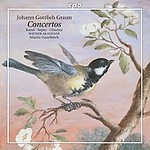
Concertos
 $36.00
Out of Stock
$36.00
Out of Stock2-4 weeks add to cart
JOHANN GRAUN
Concertos
Daniel Sepec (Violin) / Wiener Akademie, Martin Haselbock
[ CPO / CD ]
Release Date: Friday 30 November 2007
This item is currently out of stock. We expect to be able to supply it to you within 2 - 4 weeks from when you place your order.
During his own lifetime, J.G. Graun, the brother of Carl Heinrich Graun, was the epitome of a famous musician both as a gifted violinist and as a 'fiery instrument composer'. He wrote the majority of his instrumental works for the concerts of the Prussian court orchestra, of which he was concertmaster.
Johann Gottlieb (1702-1771) was marginally the older of the two Graun brothers who played an important role at the Berlin court of Frederick the Great. Unlike his brother Carl Heinrich (1704-1759), who as Kapellmeister devoted himself principally to opera, J. G. was a violinist who was appointed concertmaster of the Berlin orchestra, having first arrived in the city in 1733, when the future king was still Prince Frederick. Evidence that Graun had achieved a reputation as a violinist several years earlier is suggested by the fact that Bach sent his second son Carl Philipp to study with Graun in 1726. The Leipzig cantor also paid Graun the compliment of copying out two of his trio sonatas.
Like contemporaries, such as Fasch, Stölzel, and Graupner, Graun's compositional output was enormous, including as it does some 60 concertos for his own instrument, and over 100 symphonies, in addition to other concertos and a substantial body of chamber music. Unsurprisingly, little of it has been recorded, although Fanfare 22:1 did bring me a double offering in the shape of an attractive Concerto for Recorder and Violin on a CD that also included works by Graupner and Fasch, as well as a disc of viola da gamba works written by Graun for the Berlin virtuoso, Ludwig Christian Hesse.
One of the soloists on that disc was the splendid Vittorio Ghielmi, who here plays another of the virtuoso concertos Graun provided for Hesse. It's a substantial three-movement work, less intense than the A-Minor Concerto on the earlier disc, but containing plenty to keep the performer on his toes. The most winning movement is the central Adagio, built on a plaintively appealing melody that has more than a hint of opera aria about it. Ghielmi is well up to the demands of the work, although the balance with the orchestra is not ideal, and I'm not convinced by his cadenzas.
Both violin concertos display many of the hallmarks of the Berlin style typified by C. P. E. Bach. Here is the same nervous intensity, the same love of unisons (often incorporating a trill), the same propensity for disruption and dynamic contrast. It was a style Burney considered "rather coarse" when he heard one of Graun's violin concertos on his Berlin visit, but the Concerto in A is of particular interest for the unexpectedly contrapuntal nature of its second and third movements. "Rather coarse" might also be an appropriate epithet for the present performances, at least at times, but there's no denying the commitment and expressive intensity with which Ilja Korol tears into the unruly D-Minor Concerto, and he manages some fine cantabile fiddling in the Adagio.
Arguably, the most interesting piece is the intriguingly entitled Sinfonia grosso, a late three-movement work dating from 1768, three years before Graun's death. "Grosso" here is not used in the old Baroque sense, but presumably refers to the very full scoring that includes three trumpets, two horns, and timpani, in addition to the expected complement of wind and strings. The at times undisciplined fervor of the earlier works has now been abandoned in favor of proto-Classical gestures, although the notes are going rather far in describing the relatively brief opening Allegro as coming "very close" to sonata form. The binary structure is in fact closer to that of a Domenico Scarlatti sonata. It's an exciting piece, with lots of bold outbursts from the brass and drums, and one suspects Frederick may have responded to the militaristic nature of the outer movements rather more than he did to the abrupt, disjunct virtuosity of his concertmaster's concertos. The playing of the Wiener Akademie is longer on fiery fury than finesse, but these are undeniably effective performances that should please listeners interested in the repertoire.
Tracks:
Sinfonia grosso in D major
Concrto for Violin in D minor
Concerto for Violin in A major
Concerto for Viola da Gamba in A major